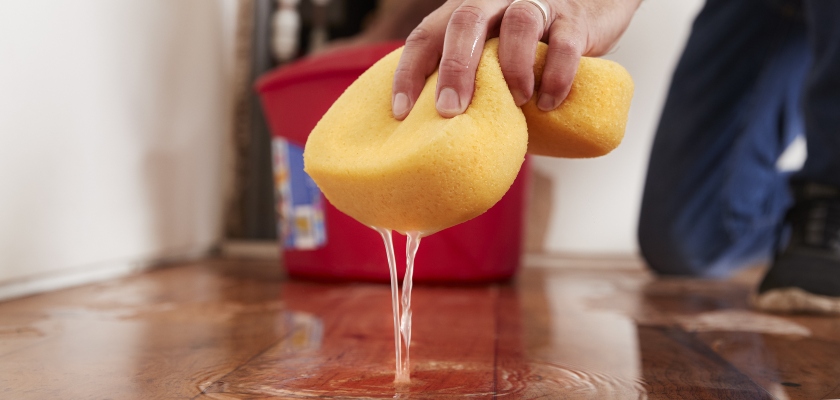Flooded basements are among every homeowner’s greatest fears. Years of memories could be stored in the basement along with furniture, clothing, holiday decorations, and many other important family possessions.
Most homeowners can take advantage of flood insurance included with their home insurance coverage, however coverage varies and it’s important to reach out to your carrier right away to understand your policy’s limitations.
Select Home Warranty offers coverage on repairs and replacements for your home’s most needed appliances and systems through a home warranty. This coverage excludes damage in the case of flooding, leading homeowners to take unique steps before and after a flood to best recoup expenses.
Learn more about home warranties today by giving us a call: 860-288-4791
What to do When the Basement Floods
When first approaching a flooded basement, take caution to not touch anything electrical in your basement while it is flooded. If you’re dealing with standing water that may cover outlets, it’s recommended to shut off electricity to your property before beginning the clean up. If you suspect the flood could be due to a water leak, shut off water to your property as well.
Be prepared to enter the flooded area with boots and gloves. Flooded basements can become very slippery and should be dealt with one step at a time. Water can dislodge items and bring debris into your home, so be aware of glass and other dangerous materials while moving slowly through the clean up process.
Follow our 5 steps below to help recover from a flooded basement.
1. Get the water out of the flooded basement.
Depending on how much water is in your basement, you will need a sump pump placed at the lowest point of the basement for standing water and can use a wet/dry vac once the water is under 2 inches. This could be challenging if you’ve lost or shut off the electricity, which often happens during hurricanes. Hand pumps can be attached to your sump pump in order to pump the water out manually. Be sure to lead your hose towards an outside drain that will not leak back into your property and check that the drain in the floor of your basement is not clogged if you have one.
Once the majority of the water is out, consider using a mop and towels to hand dry the remaining water, and set up box fans and dehumidifiers to help the drying process further over the next few days. If the weather isn’t calling for more rain, open up all windows and doors to the basement to help with air circulation.
2. Remove wet and damaged items.
Mold can grow quickly after flooding. It’s essential to remove the remaining wet items from your basement and place these items in a safe, ventilated location to dry for the next 48 hours. When it comes to electrical items, such as lamps and appliances, keep these items in place and allow them to dry without moving them. They’ll need to be assessed safely at a later time.
Flooding brings muddy water into your home, and many of these items may be too damaged to clean or repair. For important papers, such as birth certificates and passports, one solution is to freeze these papers in your freezer to prevent mold growth. Take steps to replace these important documents if they are too badly damaged to keep.
Consider replacing cardboard boxes with plastic containers to help keep your possessions protected next time water enters the basement.
3. Remove the carpet.
It’s likely that your carpet can’t be saved or at least needs to be removed at this time in order for the basement to dry. The flooring underneath the carpet may still retain moisture and can cause major mold issues if left untouched.
Consider replacing the carpet with a thin synthetic fiber carpet, which is highly breathable, or area rugs that can be easily removed and dried separately.
4. Assess your damaged appliances.
If your washer and dryer are kept in the flooded basement, do not use them until a qualified service technician has assessed them for damage. This can be very difficult to accept as you will need to wash and dry clothing and towels as part of the clean up, but consider bringing these items to a laundromat where you can clean many items at once to save time while also taking precautions with your own washer and dryer.
Before flooding, it is recommended to unplug the washer and dryer. If you did not have a chance to unplug these appliances, be sure electricity is shut off before you enter the flooded basement. Running your washer and dryer while they are still wet from the flood can cause them to be inoperable, and it is recommended to have a technician assess these for damage before you use them again.
Consider raising your washer and dryer on a platform in case the basement floods in the future.
5. Prevent the basement from flooding again.
Clean and maintain the gutters around your property so that they do not drain into the basement. Your rain water should lead away from your home and landscaping might be required to better lead run off water down hill.
Consider installing window well covers. These covers can help prevent water from seeping into the basement. You may also want to inspect your foundation for cracks. Older homes are more likely to require this type of maintenance over time.
Home Warranties on Appliances
Keep in mind, preventing a flooded basement is always less costly than a damaged basement. Select Home Warranty does not offer coverage on appliances or systems that have been damaged due to flooding or any damage due to mold.
Home warranties can help save on costs associated with repairing and replacing your appliances due to mechanical damage, including washers, dryers, heating systems, refrigerators and more. With a monthly or annual payment, you would owe a modest day-of service fee and the costs to repair or replace your appliance or system, no matter the age, is covered based on your terms of service.
Are you looking to protect your home appliances from costly mechanical damage down the line? Speak with us today to gain greater peace of mind. Call: 860-288-4791

